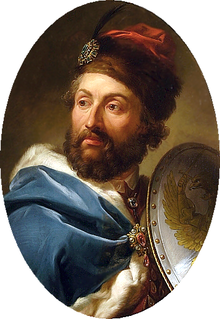Kazimierz IV Jagiellon
| Casimir IV Jagiellon | |||||
|---|---|---|---|---|---|

Casimir IV, by Marcello Bacciarelli
|
|||||
| Grand Duke of Lithuania | |||||
| Reign | 29 June 1440 – 7 June 1492 | ||||
| Coronation | 29 June 1440 in Vilnius Cathedral | ||||
| Predecessor | Sigismund Kęstutaitis | ||||
| Successor | Alexander I Jagiellon | ||||
| King of Poland | |||||
| Reign | 25 June 1447 – 7 June 1492 | ||||
| Coronation | 25 June 1447 in Wawel Cathedral | ||||
| Predecessor | Władysław III | ||||
| Successor | John I Albert | ||||
| Born |
30 November 1427 Kraków, Poland |
||||
| Died | 7 June 1492 (aged 64) Old Grodno Castle |
||||
| Burial | Wawel Cathedral, Kraków | ||||
| Spouse | Elisabeth of Austria | ||||
| Issue Detail |
Vladislaus II of Bohemia and Hungary Hedwig Jagiellon St. Casimir Jagiellon John I Albert of Poland Alexander of Poland Sophia, Margravine of Brandenburg Elżbieta Sigismund I the Old Frederick Jagiellon Barbara, Duchess of Saxony |
||||
|
|||||
| Dynasty | Jagiellon | ||||
| Father | Władysław II Jagiełło | ||||
| Mother | Sophia of Halshany | ||||
| Religion | Roman Catholic | ||||
| Full name | |
|---|---|
| Casimir Andrew Jagiellon |
Casimir IV KG (Polish: Kazimierz IV Andrzej Jagiellończyk [kaˈʑimi̯ɛʒ jaɡi̯ɛlˈlɔɲt͡ʃɨk]; Lithuanian: Kazimieras Jogailaitis; 30 November 1427 – 7 June 1492) of the Jagiellonian dynasty was Grand Duke of Lithuania from 1440 and King of Poland from 1447, until his death. He was one of the most active Polish rulers, under whom Poland, by defeating the Teutonic Knights in the Thirteen Years' War recovered Pomerania, and the Jagiellonian dynasty became one of the leading royal houses in Europe. He was a strong opponent of aristocracy, and helped to strengthen the importance of Parliament and the Senate.
The great triumph of his reign was bringing Prussia under Polish rule. The long and brilliant rule of Casimir corresponded to the age of “new monarchies” in western Europe. By the 15th century Poland had narrowed the distance separating it from western Europe and become a significant factor in international relations. The demand for raw materials and semi-finished goods stimulated trade, producing a positive balance, and contributed to the growth of crafts and mining in the entire country.
He was a recipient of the English Order of the Garter (KG), the highest order of chivalry and the most prestigious honour in England and of the United Kingdom, awarded at the Sovereign's pleasure as his or her personal gift, on recipients from the United Kingdom and other Commonwealth realms.
Casimir Jagiellon was the third and youngest son of King Władysław II Jagiełło and his fourth wife, Sophia of Halshany. His father was already 65 at the time of Casimir’s birth, and his brother Władysław III, three years his senior, was expected to become king before his majority. Strangely, little was done for his education; he was never taught Latin, nor was he trained for the responsibilities of office, despite the fact he was the only brother of the rightful sovereign. He often relied on his instinct and feelings and had little political knowledge, but shared a great interest in the diplomacy and economic affairs of the country. Throughout Casimir's youth, Bishop Zbigniew Oleśnicki was his mentor and tutor, however, the cleric felt a strong reluctance towards him, believing that he would be an unsuccessful monarch following Władysław's death.
...
Wikipedia
